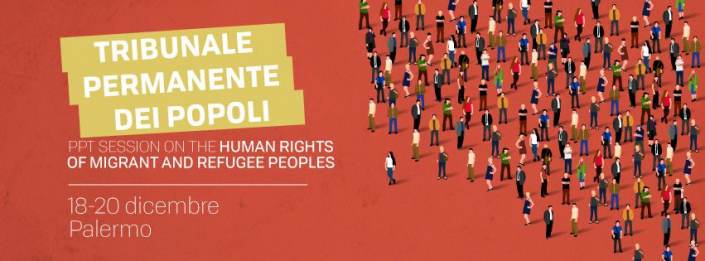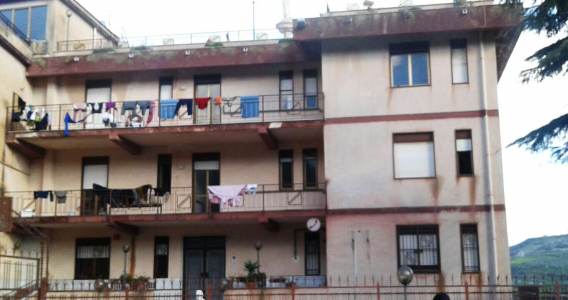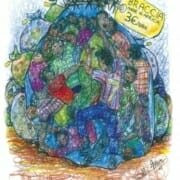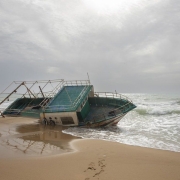The Story of Peter and Precious
Every day in Italy we hear news about wrong or absurd laws, about incidents of open racism and explosions of hate. Almost every day the front pages feature reports on awful, raging attacks from all kinds of sources, sometimes even those of incumbent ministers.
Far from the attention of the media however, some acts of solidarity and complaints occur. Therefore we want to publicize a story that took place within the last six months, that had a happy end and gives us hope for the future. Nevertheless, it is important to mention the numerous worrisome moments, absurd administrative obstacles and hence resulting dangers for the lives of vulnerable people. For this reason we feel obliged to speak as well about those causing these precarious conditions.
At the outset, this current case prompts us to three basic considerations:
The first is an open question: What are the effects of the ever growing bureaucratization and the dehumanization of the lives of migrants in our country, and how much further will these conditions be taken?
The second concerns the acknowledgement by the solidary forces in our country––I speak of our network from ARCI Porco Rosso to Borderline Sicilia, but certainly not only of us––that show us there is reason for hope.
The third consideration, not any less important, concerns the resiliency of migrants, their patience and perseverance, with which they shape their future as well as their bravery, which together with solidary alliances has the power to overcome the racist walls being erected everywhere.
Let’s go back to the beginning. In January this year, residents of an extraordinary reception centre (CAS*) in the province of Palermo learned that their centre will be closed. It was never easy to live in this village: the waiting time for necessary documents was endless. While the isolation of the village provided desperately needed rest and solitude for migrants after their months long, dreadful journey, the necessary resources to learn the language or search for a job were not available. In spite of all this, that reception centre was the only place in Italy they had known. Its closure was another traumatic experience of loss and hopelessness.
These and other conditions prompted a lot of migrants in the last few years to leave the reception centers and look for their futures elsewhere––another city, another country, another something they themselves know nothing about yet. A young couple from West Africa is among them. Let’s call them Precious and Peter.
At the time they decided to leave the province of Palermo, Precious was seven months pregnant. Their search for happiness led them north––maybe to France or Germany, maybe Milan or Turin. Without knowing so, they did what countless Sicilians did all along and are still doing. But their journey was interrupted by the premature arrival of their children. In Tuscany, Precious lost consciousness on a train and had to be brought to the nearest hospital, where she gave birth to twins and where the prematurely born children received special care.
Back then, Peter contacted us again. We had gotten to know him a year earlier during a visit to his reception centre and kept in contact since then. Since February, we not only supported his family in the management of bureaucratic proceedings. Moreover, we came to know the lackluster spirit of action and communications between the institutions endangering the families’ chances of staying together. Difficulties lay especially in the fact of the parents not being informed of the medical condition of the twins and the necessary steps and treatments. When a signature or confirmation for the approval of a medical measure became necessary, the hospital had to bring in a translator. Their situation was characterized by the confusion, fear, and paranoia they had to combat every day.
Precious––together with the twins––was admitted to the mother’s ward of the hospital. Peter however was not looked after within the same socio-sanitary structure and was considered a ‚person without permanent residence‘. He was only able find various accommodations in Tuscany due to the generous financial help of one woman they had gotten to know in the hospital and who gave them essential economic stability of her own accord, as well as the help of a network of volunteers we were able to contact from Palermo. Even though Peter’s situation was well-known, the three accommodations merely offered limited shelter for a few weeks at a time. Each time he got into trouble as well when questions about his residence permit were asked and problems made, although he had the necessary papers guaranteeing his legal residency on Italian territory on him at all times. For more than two months he was the guest of a single volunteer from the region––a part of the Kurdish and Palestinian network of solidarity––who we managed to contact through an international network. Another host was a friend of the network Palermo Pride. Sadly, various associations contacted by us were not able to find a solution for Peter, due to there being a strong demand for support in Tuscany as well.
The confluence of an uncertain housing situation with language-related and cultural barriers frightened the twins’ parents constantly and they feared that the authorities would declare them unfit to assume parental responsibility for their children and take them away. (We want to emphasize that all of this could have been avoided if only the hospital or the relevant authorities would have consulted professionals in intercultural mediation.)
The parent’s fear was occasionally labeled as paranoia or obsession. Conversations with several parties involved caused us to be concerned about the state of alienation and abandonment in which the family was trapped––the decision on third-party care of the children or at least the separation from their father seemed inevitable. At this point the courtesy and treatment of the doctors must not go unmentioned. On the contrary, it was them who often took on the tasks of the missing social workers and showed interest in the administrative and bureaucratic problems of Peter and Precious.
Always looking for a permanent solution for the family, early on we sought talks with the reception centre where they stayed before, as well as the prefectures of Palermo and Pisa. Information given by employees of the centre were rare, not always concurrent and sometimes simply false. For example, one social worker had advised the family, surely with good intent, that with their leaving the CAS* they „were in an illegal status, due to Salvini’s security decree“. And so the problematic conduct of the centre’s employees not only concerns the bureaucratic and judicial issues, but also the operation of the centre itself, especially related to its closure––which is again related to the unclear information given by the cooperation to their employees. For the centre is still in operation today.
It is equally important to point out that the directives and summonses by the prefectures were characterized by total incomprehension. No person, be it Italian citizen or foreigner, would have been up to the situation of finding their way around the bureaucracy and administration without the help of a large network of professionals. Communication with public officials takes time, and the system itself is founded upon long waits and inexplicable rejections. After a lot of queries and reminders on our part, the prefecture of Palermo has agreed to a renewed reception in a CAS* within the province of Palermo. At the same time the prefecture of Pisa informed us by phone that they had neither the possibility nor the willingness to accommodate the family in Tuscany.
The most disgraceful and Kafkaesque situation arose when both prefectures for weeks were not able to begin an acceptance process or even mutual deliberations on the matter. The prefecture in Pisa had the opinion that they were under absolutely no obligation to accommodate an unknown family. The prefecture in Palermo in turn refused to initiate an acceptance process without an official statement from Pisa.
We have gathered that during this entire process clerks of the prefectures refused to establish phone contact with each other. The only allowed form of contact was supposed to be authorized e-mail. But precisely this requirement led to lengthy delays.
In spite of everything, the efforts of the prefecture of Palermo should not go unmentioned; after hours of phone calls, e-mails, declarations, rectifications and personal visits to the prefecture it must be acknowledged that they compelled the families’ re-admittance to a CAS* in the province of Palermo.
After four months, during which our group has created networks, offered assistance and in the process assumed fundamental tasks of the state, we are overjoyed to have welcomed the small family at the train station of Palermo a few weeks ago. In the following days, they have visited us in our facilities within the district of Ballarò––they are in good health and ready for the next challenges. Peter’s shy laugh, Precious’ tender and determined smile when watching their children: those are our most important strengths, our humanity.
In an essay on bureaucracy and stupidity called The Utopia of Rules, the anthropologist David Graeber writes that „…in fact all bureaucracies do this, insofar as they set demands they insist are reasonable, and then, on discovering that they are not reasonable (…), conclude that the problem is not with the demands themselves but with the individual inadequacy of each particular human being who fails to live up to them.“ This phenomenon surely applies to bureaucracy––wherever and ever since: one of the current problems in Italy is that all spheres of a foreigner’s life are subject to our bureaucracy, which obeys unjust laws and causes institutional short-circuits. The housing situation, the nutrition, the health system, a simple certificate testifying one’s birth––everything is determined by a bureaucracy that sets unfulfillable, often contradictory conditions. Then the inevitable failure is blamed on the individual, who is only beginning to understand these requirements in the first place.
The result is not only, as Graeber writes, that bureaucracy makes us stupid. The bureaucracy endangers the administrative identity of a whole generation of migrants. Without the spirit and support of volunteer organizations that have little to lose, they are inevitably––due to incomprehensible or inconsistent regulations in a constantly changing, contradictory system––at the mercy of this or that clerk’s whims and this or that operator’s incompetency.
The coming months will not be easy. But the resiliency of people like Precious and Peter, who not only have survived the dreadful crossing of the Mediterranean but furthermore the incomprehensible, paradoxical Italian bureaucracy, give us hope and the strength to continue our work and fight for their and their children’s future. We wish to see them grow up in a better world.
Sportello Sans-Papiers
*CAS Centri di Accoglienza Straordinaria––extraordinary reception centre
Translated by Christian Lamp






